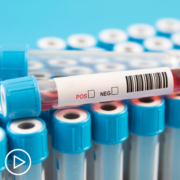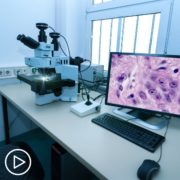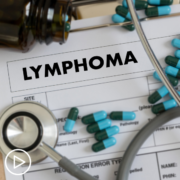What’s New for Follicular Lymphoma Treatment News and Developments?
What’s New for Follicular Lymphoma Treatment News and Developments? from Patient Empowerment Network on Vimeo.
Follicular lymphoma treatment options are expanding, so what’s the latest news? Expert Dr. Kami Maddocks from The Ohio State University Comprehensive Cancer Center shares treatment and research updates from the ASH 2023 conference.
See More from START HERE Follicular Lymphoma
Related Resources:

|

|

|
Transcript:
Lisa Hatfield:
Dr. Maddocks, there is a great deal going on in terms of emerging treatment options and clinical trial data in follicular lymphoma. Can you speak a bit to the exciting developments in follicular lymphoma treatment and the major highlights that are just coming out of the ASH 2023 meeting?
Dr. Kami Maddocks:
Yeah, I think it is really exciting where everything is at right now in the development of treatments for follicular lymphoma. I think one of the most exciting developments is in the immunotherapy treatments that we have. So just a little less than a year ago, this month, December of last year, we saw the approval of the first bispecific antibody in relapsed/refractory follicular lymphoma. So bispecific antibodies are immunotherapy. They target a protein on the lymphoma cell, the follicular lymphoma, but then they also target the T cell to activate it to engage the immune system to attack the lymphoma. So these bispecific antibodies have been highly effective in relapsed/refractory follicular lymphoma.
And what we saw coming out of ASH is some data looking at these in the frontline setting. So a lot of patients will get treated with immunotherapy with rituximab (Rituxan) antibody or chemoimmunotherapy with rituximab in combination with chemo therapies. And we saw some data looking at activity of these bispecific antibodies as the first-line treatment. In addition, currently right now, they’re approved as…the drug that’s approved is called mosunetuzumab-axgb (Lunsumio). That’s approved as a single agent in the relapsed/refractory setting.
And so there were some smaller trials looking at this in combination with other agents to see the outcomes that that produced. I think one of the exciting things is looking at it in combination with lenalidomide (Revlimid), which is an approved oral immunomodulatory therapy in relapsed/refractory follicular lymphoma. And then just lastly, I’ll say there were a few smaller studies looking at combinations of oral targeted therapies and immune therapies in the frontline setting as well.
Lisa Hatfield:
And with so many of these developments, what do you think are the most important highlights for patients and families with current treatment with clinical trials? Anything that you can highlight upon for patients and families?
Dr. Kami Maddocks:
I think, really, when you look at follicular lymphoma or more recent approvals that were looking at bispecific antibodies, chimeric antigen receptor, CAR-T cells, have been approved in relapsed follicular lymphoma, EZH2 inhibitors, so targeted therapies lenalidomide. I mean, really, when you look at follicular lymphoma, we see that patients are living longer and longer. Follicular lymphoma for many patients is somewhat like a chronic disease.
It’s managed over time with periods where they get treatment and then don’t. And what you look at with all of our therapies is we really are looking at immunotherapy and targeted therapies, both in the relapsed setting, but also now in the frontline setting, as opposed to or in place of chemotherapy.
Share Your Feedback:
Create your own user feedback survey










